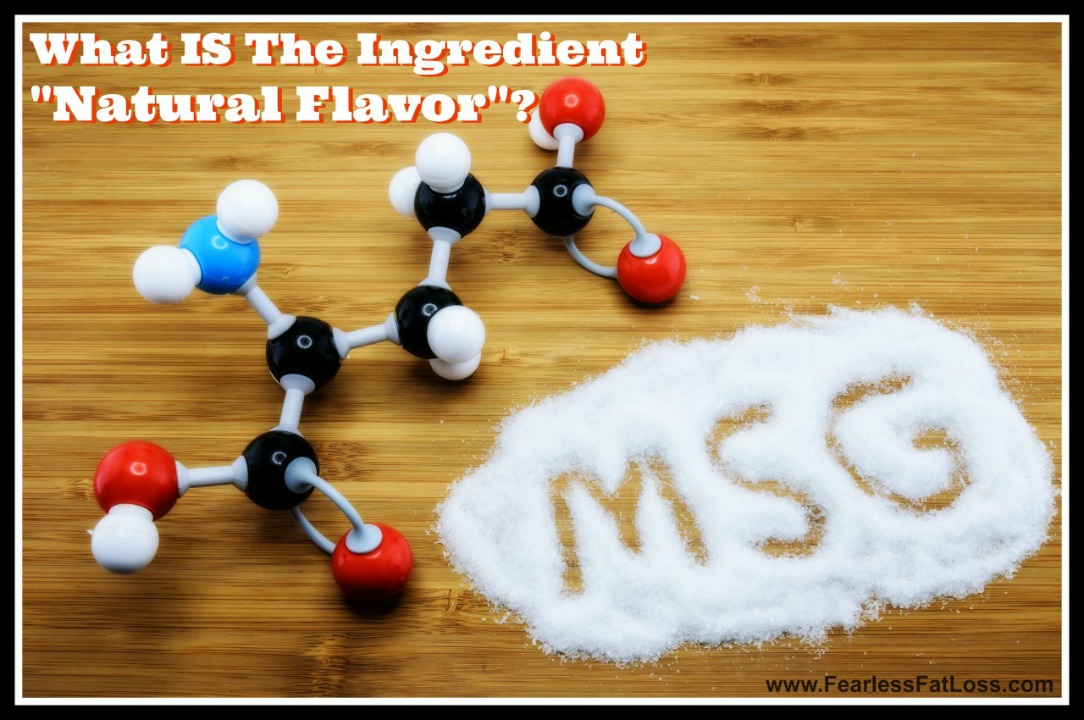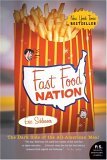
Have you ever noticed the ingredient “natural flavor” listed on a food label? I’ve read it on the label of ground turkey that I purchased in the past, as well as listed on various other food items.
I didn’t think much of it and now I realize that I was definitely uninformed. Perhaps there was a part of me that did not want to question it, but I did think that it meant what it said, that it truly was natural.
I have since learned by reading “Fast Food Nation” by Eric Schlosser, that natural flavoring is anything but natural. Natural flavor is a man-made additive, and it makes processed food and fast food taste outstanding. It’s not the only additive that flavors our (processed and fast) food, but it sure does a great job.
That wonderful taste is what keeps you coming back and buying more. But where does that taste come from? Are there world class chefs creating new recipes for the processed food giants? Not exactly; you see, that natural flavor is concocted by scientists, naturally called “flavorists”. 😉 They are employed by the American flavor industry, which incidentally, has an annual revenue of approximately 1.4 billion dollars.
Flavor is where it’s at. If you don’t like how a food tastes, you aren’t going to buy it again. On the other hand, if you love the taste, it will hook you in and keep you strung out until you get your fix again. Why is taste so important? When you think about it, it is the #1, most important quality in food. I can attest to this fact since I’ve been sick with a severe cold for over a week. I haven’t been able to taste anything, so it didn’t matter what I ate. When your taste (derived mainly from smell) is present though, it rules what you eat, or at least, what you want to eat.
So-called natural flavor is produced in laboratories to give flavor to processed foods that lose almost all flavor through the processes of freezing, dehydrating, and canning. It is made from infinitesimal amounts of chemicals, or more so a collection of gases.
Here’s an astonishing example at Wendy’s. On this page under “Add an Item”, I chose the menu category, “Wendy’s Old Fashioned Hamburgers”, and the menu item, “Steakhouse Double Melt” to list the ingredients of their Steakhouse Double Melt. Now, I’m not trying to pick on Wendy’s (this used to be one of my favorite places!), however of the list of 18 items that make up the burger (bacon is listed twice, which makes a total of 19 on the page), 10 of them contain the ingredient “natural flavor”. Out of the 8 that do not list “natural flavor” in their ingredients, 3 do not have any “ingredients” at all:
- 2 hamburger patties
- Bacon (3 strips)
- Mustard
- American cheese slice
- Pepperjack cheese slice
- Onion (no ingred.)
- Tomato (no ingred.)
- Lettuce (no ingred.)
So, this is one of the reasons I always loved the food at Wendy’s, the others being sugar, fat, flour, and HFCS (high fructose corn syrup). Yes, the food tastes fabulous, however I was addicted to it, and it gave me extra fat to carry around with me.
The bottom-line question is, “is natural flavor harmful to my health?”. I don’t know, I haven’t researched the health aspect specifically yet, however my common sense tells me if I eat food that contains this ingredient, I am eating highly processed, and actually chemically processed ingredients. I guess the way that I would approach it is with the question “is natural flavor going to benefit my health?”. The answer for me is no, now that I know exactly what it is.
Some of this information can be very frustrating (at least for me it is), because this is yet another ingredient that is present in so many processed foods. For the most part, if I am eating at my healthiest and eating only whole foods, then I am fine. However, I have just learned that “natural flavor” is in the protein powder that I use. This is an ingredient that I did not look for and I bought the protein powder before learning about it.
Granted, protein powder is a processed food source, and I can get protein from whole foods instead. I don’t have to have protein powder, and in fact, I prefer whole foods anyway. It still is a bit frustrating to me, though. Is it true that ignorance is bliss? Sometimes it almost seems so, however I won’t give up on learning and improving no matter what.
In closing, yet another book that I strongly recommend reading is Fast Food Nation by Eric Schlosser. Most of the information I wrote about here is based on what I learned in this book. There is so much more to learn though, as the topic of “natural flavor” is only a small part of what is included in this fascinating book.






Another excellent post, JoLynn.
I’ve never thought about the “natural flavor”. I think I’m going to need to pick up “Fast Food Nation”.
Brian
Hi Brian,
Thanks!
Fast Food Nation is an excellent read, I hope you do get it.
I had never questioned “natural flavor” before, quite interesting, isn’t it?
All the best,
JoLynn
Hey,
We have a bit in common.
A few weeks ago, I took a good look at my canned tuna and some other canned foods I thought were all natural healthy choices. Well I was a bit ignorant in thinking that if its not fast food, or some kind of dairy product, that I would be fine. One day I checked out the ingredients and what did I see?????? out of the short list of ingredients that these foods had, one of them was “Natural Flavour”. I, like you, didnt think much of it, and thought it just being a dirived flavour from a fruit of vegitable…Well I finaly took the initiative to google Natural Flavour, and this is where your site came in…Thx man, I thought it seemed fishy to me. I’m gonna read the book too when I get the chance…
I’ve switched to eating just whole foods too, especially beans and rice…I’m fasting for 50 days so I can get used to it, then I will be most likely keeping that diet standard. I’m even sick of meat, just by the crap ways they grow it. After my fasting, the only meat I’m gonna eat is the one I catch my self.
It seems like today’s society is all about controlling everything that has to do with health, making even the most natural things, unnatural…I am getting very sick of it. Everything we need is in nature, and can grow without much interferrence from humans, but instead of sticking with that, we decide to make our foods, using unnatural methods, which some are already having effects on us (obesety, cancer risks? ect.). And its funny because we have an abundance of it, much MUCH more than we need, while many, MANY people are dying from starvation, and malnutrition…A very frustrating, sad world we live in.
Sorry for the long comment.
thx again for the info.
Hi Kosta,
Np on the long comment, you had a lot of good stuff to say!
I didn’t used to read the ingredients either – it’s amazing what you find out when you start reading them. And along with the book, check out the Fast Food Nation movie, too – amazing!
I’m totally with ya on the whole foods – I feel so much better when I’m eating clean, whole foods and drinking clean water. I do eat meat but mainly chicken breast and fish.
I think you’re right about the connection between the rise in health problems and processed foods – in fact I think it’s obvious, but maybe many don’t want to see it. Processed food tastes good and is easy, but imho, nothing tastes better than whole foods once you detox yourself off of the processed gunk. 😉
I’m trying my hand at growing some of my own veggies this spring – I’ll blog about it, too. I grew up eating fresh food out of the garden (my dad is an avid gardener) but I haven’t done it myself until now. I’m excited to see how it all turns out.
Keep on your healthy path, all the best to you with your fast (I don’t know how you do that, kudos to ya!).
I actually work as a flavorist assistant so allow me to inform you about my and their job. When you say that flavors are gases, you are correct in one sense that any chemical needs to be in a vapor form to reach your nose. No solid or liquid makes it from your mouth to nose on its own. Most of what you taste are volatile liquids with low vapor points that are released into the air in your mouth for you to taste.
At the flavor house we use a huge number of chemicals, in the thousands, to replicate a taste for a customer. All of these chemicals are approved for use as flavorings by the FDA and are generally recognized as safe. We also are using them at extremely low concentrations, in the ppm range. It really is amazing that the mouth and nose are able to sense these chemicals at such minute quantities. Since we are not using extremely large quantities or dangerous chemicals at any time, it is actually one of the safer jobs in chemistry.
One the ubject of natural flavorings, it is true that many natural chemicals we put in are not from the original source. It would be wildly expensive to try and remove the ethyl butyrate from strawberries for instance. In many cases, the natural chemicals are created by a bacterial reaction, like yeast fermenting to make bread. In other cases we do derive the flavorings from the actual plant. Essential oils, from flowers, fruits, and herbs are very important and are a key to making a flavor harmonize without too many notes sticking out.
If you thought you were worried about natural flavorings though, did you stop to think about artificial ones? Truthfully though, I am even less concerned about these. Artificial chemicals are just like natural ones, except cheaper and produced through chemicals synthesis instead of a biological route. Their quality is higher and the impurities are lower (although some impurities, such as in mint oils , play a role in how you distinguish between brands). Add in the fact that the artificial chemicals are much cheaper and you can see why a lot of manufacturers where labels are not widely read will use these. But the label artificial is a negative to many people, so companies are forced to pay more for the natural chemical to satisfy consumer opinion, even though they may be getting something that is the same or inferior to an artificial.
Hi Seran,
Thank you very much for your input! 🙂 What you have described is what Eric Schlosser wrote about in Fast Food Nation, the book I referenced in my article in which he interviewed a flavorist (could have interviewed more than one, I don’t have the book in front of me at the moment). He also wrote about the artificial flavors however that is a different topic than natural flavors, which is why I didn’t include it in this article. One thing about that label though – at least it tells it like it is, telling the consumer it’s artificial.
The only thing that I don’t always have confidence in though, is the FDA. They say that refined sugar is safe when it is highly addictive and they won’t allow Stevia to be marketed as a sweetener, however they allow for manufacturers to label their products so that the consumer thinks something is sugar-free or trans fat free when in actuality it is not. That’s why I wrote this article – because a product is being labeled as a “natural” flavoring, leading consumers to believe it’s natural when it’s not.
The whole thing is that if the processed food ingredients were labeled for what they really are then OK, but they aren’t, nor will they probably ever be because sales would likely decrease.
For myself, there actually are some flavorings I have used (like maple flavoring) however for the most part I stick to whole foods that don’t contain any chemicals, added flavorings or refined sugars. Again though, I sincerely appreciate your input because I don’t have the personal experience in the job that you have as a flavorist. Thanks for giving a peek inside! 🙂
Natural flavoring in another name for monosodium glutamate. Actually, MSG has over 25 names for itself carefully chosen so that we do not know it is infecting our food! That includes
milk, processed foods, some medications/vitamins, coffee and lots more. Visit these websites to see how we are being slowly poisoned.
quality-of-life.ca/msg.htm
http://aspartame.ca/msg%20names.htm
Learn about what you are eating and stop the slow poisoning of Americans with MSG!
http://www.truthinlabeling.org/
Hi Chris,
Very interesting – I wrote a post about MSG and you’ve given me more to look at now. While I haven’t been able to completely take in all bits of the info you suggested, from what I did read I’m not surprised that MSG is so prevalent in food – it’s a great way to get consumers addicted and wanting more and more…
Hi JoLynn,
I’ve a question for you. I was eating Salse Verde Doritos here at work and I was looking at the ingredients. One of the last ingredients was “Natural Chicken Flavor”. I decided to search “Natural Chicken Flavor” on google and I found your blog entry. Do you know if this comes from actual chickens or does this comes from various (non-meat) chemicals from the laboratory? I recently decided to give a vegan lifestyle a try after eating an extreme amount of meat throughout my life. I would appreciate your response. – Ken
Hi Ken,
I haven’t seen that one yet and I’m 99% sure it’s got MSG in it, check out this link and look in the right hand column, 2nd down, the ingredients of “Gravy Mix, Chicken”. It includes the ingredient “natural chicken flavor” and what follows it in the parentheses are what’s in that ingredient: chicken fat, chicken stock, natural flavors, maltodextrin, partially hydrogenated soybean oil.
So, it looks like it does have chicken in it. What concerns me is the natural flavor and maltodextrin, though, as well as the partially hydrogenated soybean oil (trans fat).
“Natural Flavor” is another name for MSG <- check out that link to my latest post on this topic. Maltodextrin often contains MSG, too, Also check out the links that Chris left in comment #7 above re: natural flavor being one of the cover up names for MSG - it can contain 30 to 60% MSG. I hope this helps - I realize that your concern is avoiding the chicken but I strongly urge you to avoid MSG at the same time. 😉
Why do mcdonalds use beef flavor on their fries!! I just found that out, it seems like people sneak animal products in everything!! what about people who don’t want it? who would have thought fries, jello,cake,candy? come on!!
“natural flavor” , is an excitotoxin (linked to lesions in the brain).